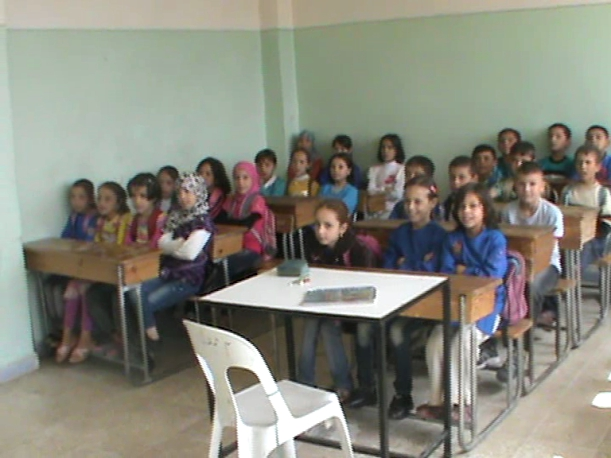Schools in Idlib’s countryside have been shut down for a long time now. They were forced to close because of the constant shelling, and many are now being used as temporary shelters for refugees from other areas. But there are determined efforts to reopen schools for the students regardless of the daily shelling in villages. These efforts are face many challenges including the weakened education system and the absence of most teachers and required materials. Teachers have had to teach the main information to students in the absence of material and the curriculum.
Today, Mr. Bayrem, who has one brother in a regime prison, is both a teacher and a student at Aleppo University. He talked with us about the educational status of his current third graders and the difficulties he faces in trying to teach them with first-grade materials. He fears the new generation could grow up illiterate.
Preschool
A few female teachers have opened up preschools in their own homes to prepare young children for higher grades. "The Hope Preschool," attempting to bring a smile to the children's faces, consists of one room with only a few chairs, and lacks a blackboard, and such basic teaching tools as books and toys. One of the teachers, Ms. Khansaa, explained, "The preschool was warmly welcomed by the people of the village and we are hoping it's the first step in the right direction."
Curriculum
The curriculum that is now being used—if teachers have it available—is the same curriculum the Syrian government has always used, but with some modifications, like erasing the common glorification of the old regime’s words and actions.
Salaries
Teachers in the FSA controlled areas don't get paid by the government, mostly because of their participation in the revolution and their stance against Assad's regime. Luckily, there are many university students who teach voluntarily, having decided they cannot stand by and watch the new generation become illiterate. Mr. Mahmoud, a student who was expelled from the university said, "I teach children for free… I know Bashar wants to take us back centuries but we are not going to let him do so… We are going to use all means possible to win this revolution.”
Parents
Most parents express relief and satisfaction for their children attending school. They claim that the children might forget about the shelling, the war and their displacement. Raqqia is a mother of four children and she spoke to us about her relief about this and some of the obstacles she faces. For example, the basics, like stationary, are expensive, and a pencil costs 20 pounds—if you can get it— because they’re brought in from Turkey.
Mosques
A little under three years ago when children regime shelling of schools meant that children lost access to basic spelling and math education, groups of people began teaching them letters and the Quran.
Groups
In times of shelling, homes often lack all services, including telephone and electricity. Because of this, some people began gather to exchange their opinions. Some of them used the opportunities of getting together to begin to learn the Quran. Ahmad, a young man, told us about their activities in the Muslim community, "We come every day to each other to learn Quran and pray for this crisis to end."
This is a glimpse of what the role of educators is in this revolution.
By: Mohamad Alkassem, Idlib Countryside
......


